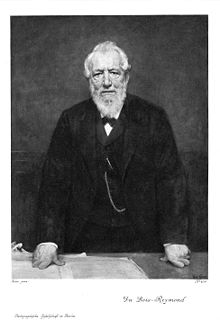我們現在不知道,將來也不知道

拉丁格言「ignoramus et ignorabimus」(英語:we do not know and will not know),中文譯為「我們現在不知道,將來也不知道。」代表認為科學知識有限的概念。在這個意義上,這句話的流傳是來自德國生理學家埃米尔·杜布瓦-雷蒙在1872年出版的著作 《關於自然知識的限制》(Über die Grenzen des Naturerkennens)。
背景
[编辑]宇宙的七大謎題
[编辑]杜布瓦-雷蒙1880年在普魯士科學院的一次著名演講中,討論到「宇宙的七大謎題」時,使用了「我們現在不知道,將來也不知道」這個片語。
他定義了七個「宇宙之謎」,宣稱其中三個是“超越”的,科學和哲學都不能解釋。 這三個謎題是:(一)物質和力量的最終性質;(二)運動的起源;(三)簡單感官的來源 ,關於這些謎題,杜布瓦-雷蒙認為「我們現在不知道,將來也不知道」[1]。
希爾伯特的回應
[编辑]大衛·希爾伯特認為這樣對人類知識和能力的概念太悲觀了,考慮不能解決的問題而自己限制自己的理解。1900年在巴黎數學家國際大會的一次演說中,希爾伯特表示人類的努力可以回答數學問題。他宣稱:“在數學中,沒有無知的人”[2]。他和其他形式主義者在二十世紀初建立起數學基礎。
1930年9月8日,希爾伯特在德國科學家和醫師協會(Königsberg)的著名演講中詳細闡述了他的意見:[3]
| “ | 我們不能相信那些今天以哲學背景和審慎語調來預言文化的墮落,接受無知的。
對我們來說沒有不知道的,在我看來,在任何自然科學都沒有。 |
” |
社會學的回應
[编辑]社會學家萊布尼茲討論了「不可知」,認為杜布瓦-雷蒙並不是真的對科學感到悲觀:
| “ | 這實際上是一個令人難以置信的自信,以謙虛的面具掩飾科學的傲慢。 | ” |
參見
[编辑]參考資料
[编辑]- ^ William E. Leverette Jr., E. L. Youmans' Crusade for Scientific Autonomy and Respectability, American Quarterly, Vol. 17, No. 1. (Spring, 1965), pg. 21.
- ^ D. Hilbert. Mathematical Problems: Lecture Delivered before the International Congress of Mathematicians at Paris in 1900. Bulletin of the American Mathematical Society. 1902, 8: 437–79 [2017-07-01]. MR 1557926. doi:10.1090/S0002-9904-1902-00923-3. (原始内容存档于2018-08-25).
- ^ Hilbert, David, audio address (页面存档备份,存于互联网档案馆), transcription and English translation (页面存档备份,存于互联网档案馆).
- ^ "wissen" refers to the term "wissenschaft" and educator Wilhelm von Humboldt's concept of "bildung." That is, education incorporates science, knowledge, and scholarship, an association of learning, and a dynamic process discoverable for oneself; and learning or becoming is the highest ideal of human existence.
